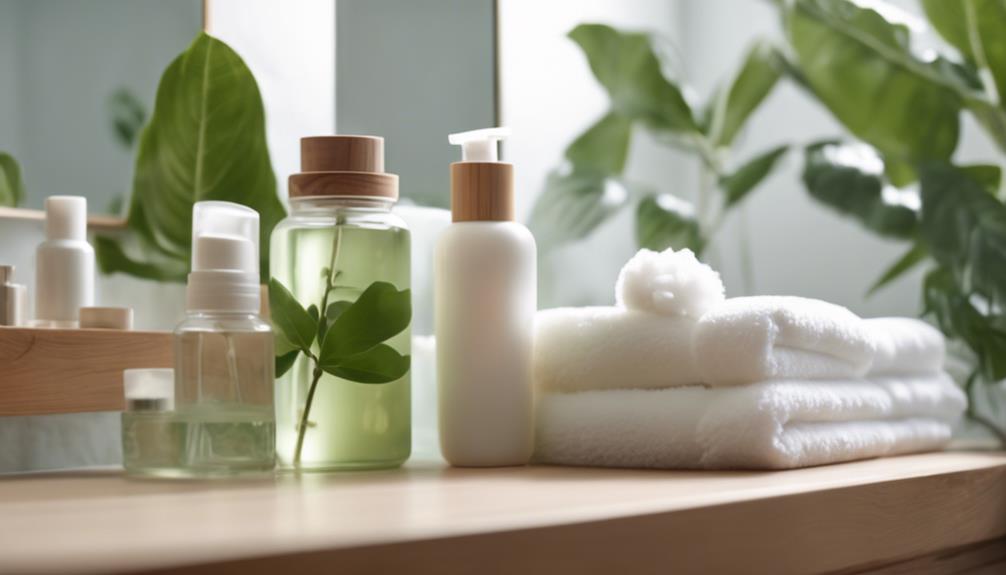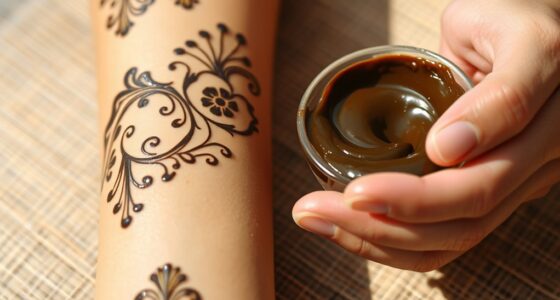For individuals with dry skin, it is important to prioritize hydration and barrier repair in your skincare routine. Begin with a gentle, hydrating cleanser to prevent your skin from becoming stripped. Follow this with a hydrating toner and serums containing hyaluronic acid and niacinamide. Utilize a rich moisturizer with ceramides and shea butter to seal in moisture. Remember to always apply sunscreen, even when it’s cloudy, to shield against moisture loss. To achieve optimal outcomes, ensure you stay hydrated through your diet and surroundings. Avoid common mistakes like over-cleansing. Continue to explore effective techniques and products to adequately nourish your skin and sustain its health.
Key Takeaways
- Start with a gentle, hydrating cleanser to avoid stripping natural oils from dry skin.
- Use a hydrating toner to enhance moisture absorption before applying treatments.
- Incorporate serums with hyaluronic acid and niacinamide for optimal hydration and skin barrier support.
- Apply a thick moisturizer containing ceramides and shea butter to lock in moisture and protect the skin barrier.
Understanding Dry Skin
Understanding dry skin means recognizing its key characteristics, like flakiness, tightness, and itching, which stem from a lack of moisture and elasticity. You might notice these symptoms become more pronounced due to environmental factors, such as low humidity or cold temperatures. When your skin doesn't retain enough moisture, it can compromise the skin barrier, leading to increased sensitivity and irritation.
Dry skin lacks oil, making it vital to focus on moisturizing products that help restore hydration levels. Depending on your skin type, you might need to incorporate different skincare products into your routine. Remember, chronic dryness can also result from aging, as oil production decreases over time.
It's essential to distinguish between dry and dehydrated skin. While dry skin needs moisturizing solutions, dehydrated skin requires hydrating products to increase water content. By understanding the unique needs of your skin, you can choose the right products to keep it healthy.
Ultimately, addressing these factors will help improve your skin's overall condition, ensuring it remains supple and comfortable, even in challenging environmental conditions.
Essential Hydrating Ingredients
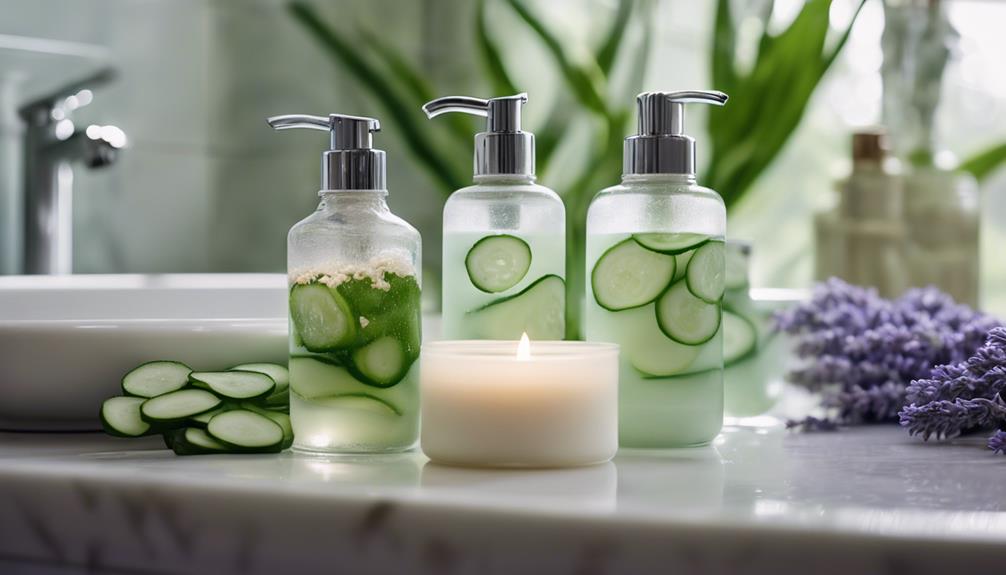
Incorporating essential hydrating ingredients into your skincare routine can dramatically improve the moisture levels of dry skin.
Start with hyaluronic acid, a powerful humectant that can hold up to 1000 times its weight in water, guaranteeing your skin stays plump and hydrated.
Next, consider ceramides; they restore and strengthen your skin's moisture barrier, reducing water loss and enhancing hydration.
Glycerin is another must-have. It draws moisture from the air into your skin, improving texture and keeping it smooth and supple.
For deeper nourishment, shea butter is rich in fatty acids and vitamins, creating a protective barrier that locks in moisture and combats dryness effectively.
Don't forget niacinamide, which not only hydrates but also enhances your skin's barrier function. It reduces redness and evens out skin tone, making it a versatile addition to your routine.
By including these moisturizing ingredients, you'll be well on your way to achieving the hydration your dry skin craves.
Prioritize these essential components in your skincare routine to guarantee a significant boost in moisture levels, leaving your skin feeling soft and revitalized.
Daily Skincare Routine

A daily skincare routine for dry skin focuses on maintaining hydration and protecting your skin barrier to keep it healthy and comfortable.
Start with a gentle cleanser that contains hydrating ingredients like glycerin or hyaluronic acid. This helps avoid stripping your skin of its natural moisture. After cleansing, apply a hydrating toner to prep your skin for better absorption of subsequent products and to lock in moisture.
Next, incorporate serums enriched with hyaluronic acid and niacinamide. These ingredients enhance hydration and strengthen your skin barrier.
Following this, it's essential to moisturize. Use a thick cream or oil-based product immediately after applying your serums. This step seals in moisture and prevents water loss throughout the day.
Morning and Night Products

To effectively care for dry skin, choose morning and night products that prioritize hydration and barrier protection.
Start your morning skincare routine with a gentle, hydrating cleanser containing ingredients like glycerin and hyaluronic acid. This will help maintain moisture levels right from the start.
After cleansing, apply a hydrating serum infused with hyaluronic acid or niacinamide to enhance moisture retention and soothe your skin.
Next, use a thick moisturizer rich in ceramides and shea butter to lock in hydration and protect your skin barrier.
Don't forget to finish with broad-spectrum sunscreen of SPF 30 or higher to shield your skin from UV damage and prevent further moisture loss.
As the day ends, shift to your nighttime skincare routine.
After cleansing, incorporate a hydrating toner to replenish moisture.
Follow this with a heavier night cream or oil, which will work overnight to restore hydration lost throughout the day and promote skin repair.
Lifestyle Tips for Hydration
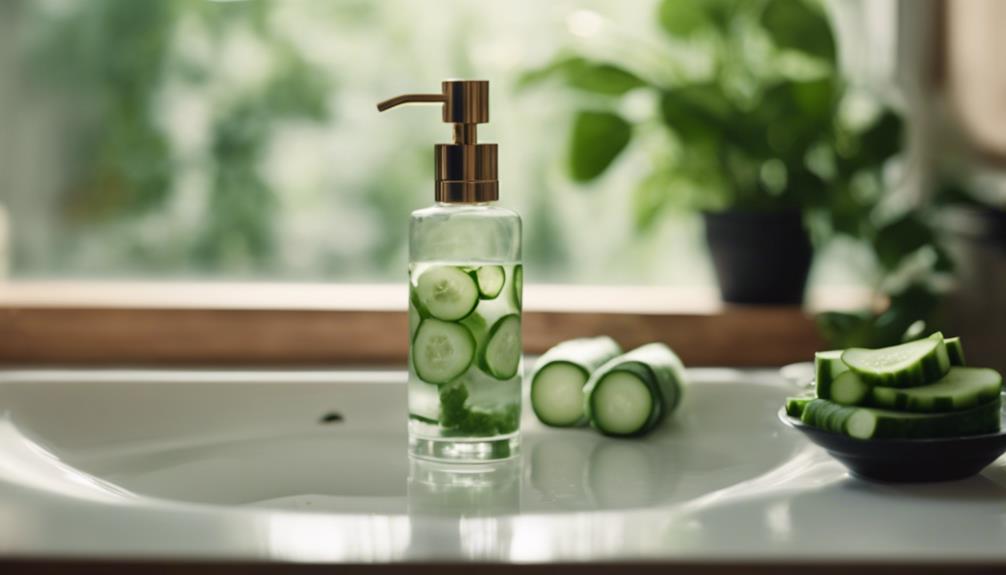
Staying hydrated isn't just about what you apply to your skin; it also involves making mindful choices in your daily life. To maintain your skin's hydration and support your skin barrier, follow these lifestyle tips.
| Tip | Benefit |
|---|---|
| Drink plenty of water | Supports your skin's moisture levels |
| Incorporate omega-3 fatty acids | Enhances skin barrier function and moisture retention |
| Use a humidifier | Adds moisture to the air, combating dry environments |
Make sure you're drinking at least 8 glasses of water daily. When showering, limit yourself to 10 minutes and use lukewarm water to preserve your skin's natural oils. Wearing breathable fabrics like cotton helps minimize irritation and keeps your skin comfortable, especially in dry or cold weather.
Consider adding salmon or walnuts to your diet for their omega-3 fatty acids, which can greatly improve your skin's hydration. By making these small yet impactful changes, you'll be on your way to healthier, more hydrated skin. Remember, consistent daily intake of water and mindful choices are key to keeping your skin glowing and resilient.
Common Mistakes to Avoid
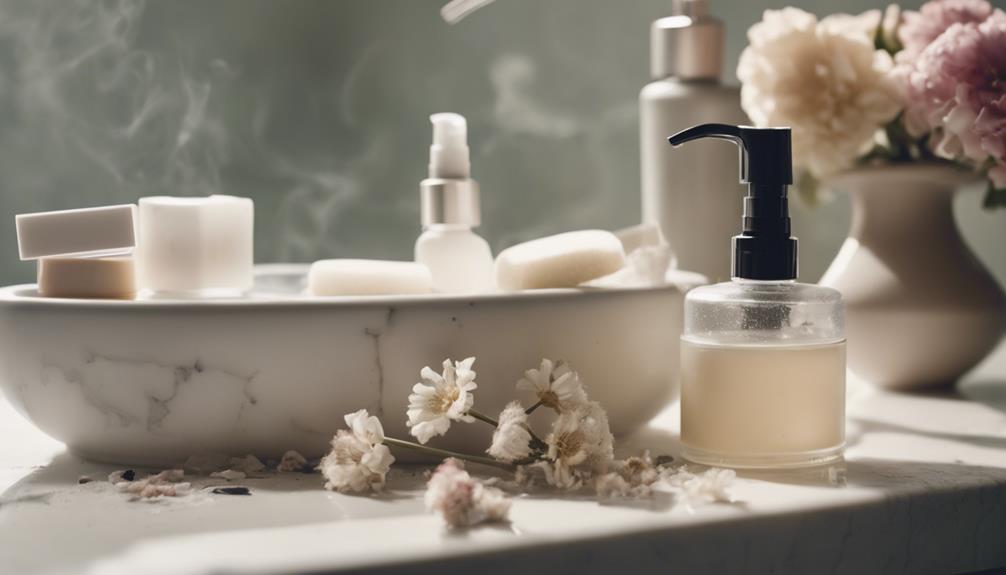
When caring for dry skin, it's essential to be aware of common mistakes that can worsen your condition.
Over-cleansing, ignoring ingredient labels, and skipping sunscreen can all lead to increased dryness and irritation.
Over-Cleansing Issues
Over-cleansing your skin can lead to dryness and irritation, especially if you're already dealing with dry skin. This common mistake strips your skin of its natural oils, harming your skin barrier and exacerbating your symptoms. To maintain hydration, follow these essential tips:
| Mistake | Effects on Dry Skin | Solutions |
|---|---|---|
| Using harsh cleansers | Strips natural oils | Opt for gentle cleansers |
| Cleansing too often | Increases irritation | Limit to twice daily |
| Skipping moisturizer | Deprives skin of hydration | Always moisturize post-cleansing |
Incorporating a hydrating toner after cleansing can help restore moisture and prepare your skin for better absorption of subsequent products. Remember, your goal is to protect your skin barrier while ensuring you're providing essential hydration. By avoiding over-cleansing, you'll minimize irritation and support your skin's natural moisture levels. So, be mindful of how often you cleanse and what products you use to keep your dry skin looking and feeling its best.
Ignoring Ingredient Labels
Ignoring ingredient labels can lead to significant setbacks in your skincare routine, especially if you're battling dry skin. You might unknowingly choose products with harsh ingredients like alcohol, which strip moisture from your skin and worsen dryness.
To effectively combat dry skin, always look for moisturizers that contain essential components such as ceramides and hyaluronic acid. These ingredients help restore your skin barrier and retain hydration.
Additionally, be vigilant about potential allergens and irritants in your skincare products. This is vital for maintaining comfort, particularly for sensitive skin. Many people mistakenly think all oils are comedogenic, but non-comedogenic options like jojoba or argan oil can hydrate without clogging pores.
Finally, don't forget to check the pH levels of your products; using overly acidic or alkaline formulations can disrupt your skin's natural barrier.
Here are some key points to take into account:
- Always check ingredient labels for alcohol and irritants.
- Prioritize moisturizers with ceramides and hyaluronic acid.
- Avoid common allergens that can worsen dryness.
- Opt for non-comedogenic oils for hydration.
Skipping Sunscreen Daily
Many people underestimate the importance of daily sunscreen, which can lead to serious skin damage and exacerbate dry skin conditions. Skipping sunscreen allows UV exposure to cause moisture loss, leading to dehydration and irritation.
To protect your skin, make certain you use a broad-spectrum sunscreen with an SPF of at least 30. This not only shields you from harmful UVA and UVB rays but also helps maintain skin hydration and preserves your moisture barrier.
It's essential to apply sunscreen every day, regardless of the weather. Many mistakenly think it's unnecessary on cloudy days, but UV rays can penetrate through clouds, continuing to harm your skin. Reapply sunscreen every two hours, especially if you're sweating or swimming, to guarantee ongoing protection.
Incorporating sunscreen into your skincare routine is fundamental to prevent dehydration and reduce the risk of premature aging. By prioritizing this step, you help maintain your skin's overall health and liveliness.
Don't let the common mistake of skipping sunscreen undermine your efforts to treat dry skin conditions effectively. Embrace daily sun protection for healthy, hydrated skin!
Professional Recommendations

When it comes to caring for dry skin, consulting a dermatologist can be a game changer.
They'll help you with personalized product selection that suits your unique skin needs.
Getting professional advice guarantees you're using the right ingredients to keep your skin hydrated and healthy.
Dermatologist Consultations
Consulting a dermatologist can provide you with personalized skincare recommendations to effectively manage your dry skin.
They'll assess your individual needs and suggest products that restore moisture and strengthen your skin barrier. Dermatologists often recommend ingredients like ceramides, hyaluronic acid, and glycerin, which are known for their hydrating properties.
Here are some key benefits of dermatologist consultations:
- Tailored advice for your specific dry skin type
- Recommendations for products rich in moisture, such as ceramides, hyaluronic acid, and glycerin
- Guidance on safe exfoliation practices to promote skin renewal without irritation
- Lifestyle tips to enhance hydration, like avoiding hot showers and using humidifiers
Personalized Product Selection
Finding the right products for your dry skin can make all the difference in achieving lasting hydration and comfort. Start by selecting moisturizers that contain essential ingredients like hyaluronic acid and ceramides. These components effectively attract and retain moisture, helping to combat dryness.
Opt for thicker creams or balms instead of lotions, especially for your nighttime skincare routine, as they create a better barrier against moisture loss.
Incorporate a hydrating serum into your regimen; one with niacinamide can soothe dry skin while improving overall texture and moisture retention.
When cleansing, choose gentle, fragrance-free cleansers to prevent stripping your skin's natural oils. Harsh cleansers can worsen dryness and irritation, so be mindful of your choices.
Don't forget to regularly assess your skincare routine based on seasonal changes. In colder months, you may need heavier products to maintain hydration, while lighter formulations might be sufficient during warmer weather.
How Can I Hydrate Dry Skin While Also Balancing Oil Levels?
Struggling to balance oil and hydration routine? Look for water-based moisturizers to hydrate dry skin without adding excess oil. Choose non-comedogenic products to avoid clogging pores. Use hydrating serums with hyaluronic acid to boost moisture levels without increasing oiliness. Consider consulting a dermatologist for personalized recommendations.
Conclusion
By embracing a tailored skincare routine, you're not just addressing dry skin; you're nurturing your overall well-being.
Each product you choose coincidentally reflects your self-care journey, reminding you that hydration isn't just about skin—it's about how you feel inside.
As you incorporate hydrating ingredients and lifestyle tips, you'll find that your skin flourishes alongside your spirit.
So, keep this routine close, and watch as the coincidence of care transforms both your skin and your confidence.
